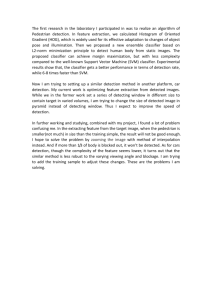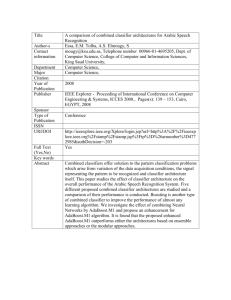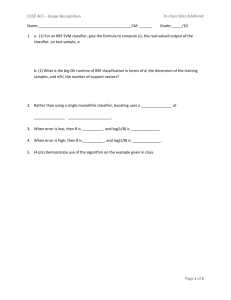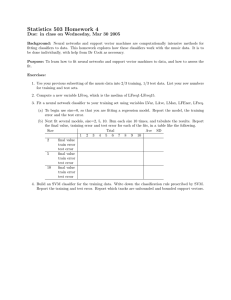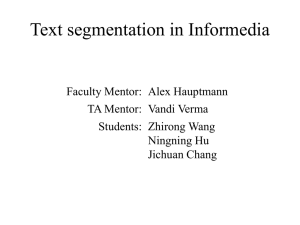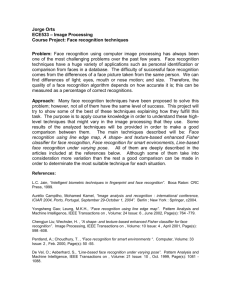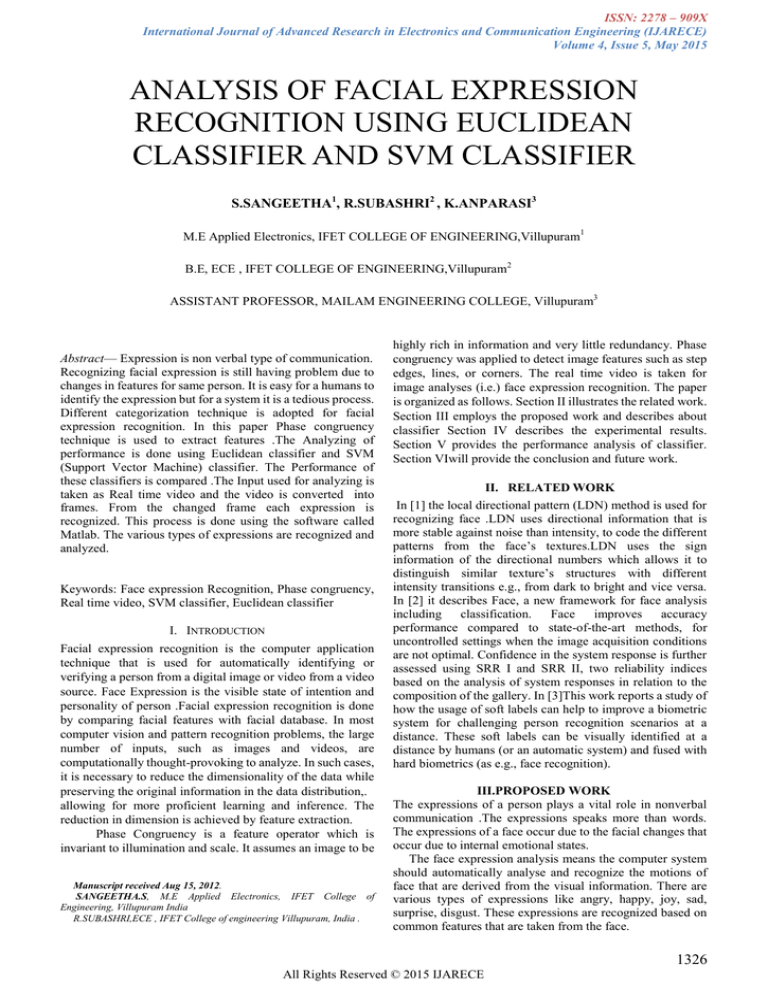
ISSN: 2278 – 909X
International Journal of Advanced Research in Electronics and Communication Engineering (IJARECE)
Volume 4, Issue 5, May 2015
ANALYSIS OF FACIAL EXPRESSION
RECOGNITION USING EUCLIDEAN
CLASSIFIER AND SVM CLASSIFIER
S.SANGEETHA1, R.SUBASHRI2 , K.ANPARASI3
M.E Applied Electronics, IFET COLLEGE OF ENGINEERING,Villupuram1
B.E, ECE , IFET COLLEGE OF ENGINEERING,Villupuram2
ASSISTANT PROFESSOR, MAILAM ENGINEERING COLLEGE, Villupuram3
Abstract— Expression is non verbal type of communication.
Recognizing facial expression is still having problem due to
changes in features for same person. It is easy for a humans to
identify the expression but for a system it is a tedious process.
Different categorization technique is adopted for facial
expression recognition. In this paper Phase congruency
technique is used to extract features .The Analyzing of
performance is done using Euclidean classifier and SVM
(Support Vector Machine) classifier. The Performance of
these classifiers is compared .The Input used for analyzing is
taken as Real time video and the video is converted into
frames. From the changed frame each expression is
recognized. This process is done using the software called
Matlab. The various types of expressions are recognized and
analyzed.
Keywords: Face expression Recognition, Phase congruency,
Real time video, SVM classifier, Euclidean classifier
I. INTRODUCTION
Facial expression recognition is the computer application
technique that is used for automatically identifying or
verifying a person from a digital image or video from a video
source. Face Expression is the visible state of intention and
personality of person .Facial expression recognition is done
by comparing facial features with facial database. In most
computer vision and pattern recognition problems, the large
number of inputs, such as images and videos, are
computationally thought-provoking to analyze. In such cases,
it is necessary to reduce the dimensionality of the data while
preserving the original information in the data distribution,.
allowing for more proficient learning and inference. The
reduction in dimension is achieved by feature extraction.
Phase Congruency is a feature operator which is
invariant to illumination and scale. It assumes an image to be
Manuscript received Aug 15, 2012.
SANGEETHA.S, M.E Applied Electronics, IFET College of
Engineering, Villupuram India
R.SUBASHRI,ECE , IFET College of engineering Villupuram, India .
highly rich in information and very little redundancy. Phase
congruency was applied to detect image features such as step
edges, lines, or corners. The real time video is taken for
image analyses (i.e.) face expression recognition. The paper
is organized as follows. Section II illustrates the related work.
Section III employs the proposed work and describes about
classifier Section IV describes the experimental results.
Section V provides the performance analysis of classifier.
Section VIwill provide the conclusion and future work.
II. RELATED WORK
In [1] the local directional pattern (LDN) method is used for
recognizing face .LDN uses directional information that is
more stable against noise than intensity, to code the different
patterns from the face’s textures.LDN uses the sign
information of the directional numbers which allows it to
distinguish similar texture’s structures with different
intensity transitions e.g., from dark to bright and vice versa.
In [2] it describes Face, a new framework for face analysis
including classification. Face improves accuracy
performance compared to state-of-the-art methods, for
uncontrolled settings when the image acquisition conditions
are not optimal. Confidence in the system response is further
assessed using SRR I and SRR II, two reliability indices
based on the analysis of system responses in relation to the
composition of the gallery. In [3]This work reports a study of
how the usage of soft labels can help to improve a biometric
system for challenging person recognition scenarios at a
distance. These soft labels can be visually identified at a
distance by humans (or an automatic system) and fused with
hard biometrics (as e.g., face recognition).
III.PROPOSED WORK
The expressions of a person plays a vital role in nonverbal
communication .The expressions speaks more than words.
The expressions of a face occur due to the facial changes that
occur due to internal emotional states.
The face expression analysis means the computer system
should automatically analyse and recognize the motions of
face that are derived from the visual information. There are
various types of expressions like angry, happy, joy, sad,
surprise, disgust. These expressions are recognized based on
common features that are taken from the face.
1326
All Rights Reserved © 2015 IJARECE
ISSN: 2278 – 909X
International Journal of Advanced Research in Electronics and Communication Engineering (IJARECE)
Volume 4, Issue 5, May 2015
There are various types features present in the face to
express the different expressions. The features may be
eyebrow, eyes, mouth. The eyebrow may vary for different
persons. The eyebrow may be right corner up, left corner up,
eyebrow may be middle up. Based on these the different
shapes can be produced in the face. The values are
normalized and it is used for recognizing. While considering
mouth as one of the feature the feature vectors are taken
based on whether the mouth is open or it is closed. Some only
produce the meaningful expressions. The basic shapes in this
is whether the corner is up, corner is down, normal. From this
shapes of mouth the features are extracted.
The scope of this project is to extract the facial features
using phase congruency (i.e.) training phase. The classifier
used for training and testing is SVM (Support Vector
machine) classifier and Euclidean classifier.
Preprocessing
The images should be resized (i.e.) normalized in order to
obtain the feature vectors easily. The feature vectors are
based on the position and geometry of images. Feature
extraction plays a vital role in pattern classification. The main
aim of feature extraction is to minimize the dimensionality of
data points for the purpose of data visualisation or
discrimination. The features can be extracted as holistic and
geometric basis. In the holistic type the whole face is taken
into account .In the geometric type the entire face is not taken
for analyses. There are various methods for extracting
features.
In this paper, the Phase congruency technique used for
extracting the features such as the lines, corners, edges in an
image. Phase Congruency is the fundamental tool for
analysing multi scale images. It allows using of threshold
values that is applied to multi class images. It is used to
extract the image in phase as well as in magnitude levels.
Classifier is used to find the regularities in patterns of
empirical data (training data). There are various types of
classifier. In this the SVM (Support Vector Machine) and
Euclidean classifier is used for training and testing.
The features like eyebrow, eyes, mouth, and nose are
considered this classifier is used because it can be trained in
many ways and it provides classification. It constructs the
hyper plane that is used for classification .In this positive
support vectors and negative support vectors are used for
categorizing the type of expression.
The Euclidean classifier is simple and the evaluation is
quick. It is easy to understand. It assumes that the data is to be
isotrophically Gaussian because it treats all features equally.
Feature Extraction (Phase
Congruency)
IV.RESULT
The simulated results used to verify the various types of
expression shown by the human beings in their face.
Real Time Video
Conversion of Frames
Input Image
Classifier (Support Vector
Machine, Euclidean)
Recognized Expressions
Fig.1.1 Block Diagram of Face Expression Recognition
The input taken is real time video. The video is
converted into frames. The converted frames are taken for
analysis.
Preprocessing is the basic step in an image processing. It
is used to remove the unwanted noise that is present in the
image. It is used to reduce the complexity for further process.
The input image is converted into gray scale image. The
histogram of an image is calculated .It is the graphical
representation of gray level values in the x-axis and no of
pixels in the y axis. Smoothing is the process of reducing
sharp transitions .It is also used to reduce noise and blurring
that are present in the image.
Fig 1.2 Expression indicating Anger using Euclidean
classifier
This is the result that indicates the anger expression. In this
1327
All Rights Reserved © 2015 IJARECE
ISSN: 2278 – 909X
International Journal of Advanced Research in Electronics and Communication Engineering (IJARECE)
Volume 4, Issue 5, May 2015
training and testing of images is done using the Euclidean
classifier.
Fig 1.3 Expression indicating Anger using SVM classifier
Fig 1.4 Expression indicating Fear using Euclidean classifier
This is the result indicating the expression using
Support Vector Machine Classifier .
Fig 1.5 Expression indicating Fear using SVM classifier
Fig 1.4 Expression indicating Disgust using Euclidean
classifier
The simulated result indicates the indication of fear
expression using the classifier.
This Figure represents that the categorization of expression is
Disgust. and the classification is done using the Euclidean
classifier.
Fig 1.6 Expression indicating Surprise using Euclidean
classifier
Fig 1.5 Expression Indicating Disgust using SVM classifier
The above figure shows Disgust expression. The training
Phase is the one in which the system is trained with
expression. SVM is used for classifying the expression the
given image which is converted as frames from running video
1328
All Rights Reserved © 2015 IJARECE
ISSN: 2278 – 909X
International Journal of Advanced Research in Electronics and Communication Engineering (IJARECE)
Volume 4, Issue 5, May 2015
VI. REFERENCES
[1] Adin Ramirez Rivera, Student Member, IEEE, Jorge
Rojas Castillo, Student Member, IEEE,and OksamChae,
Member, IEEE,‖Local Directional Number Pattern for Face
Analysis: Face and Expression Recognition‖,IEEE
Transactions on Image Processing, Vol. 22, No. 5, May 2013.
Fig 1.5 Expression indicating Surprise using SVM classifier
V. PERFORMANCE ANALYSIS
The Performance analysis is used to determine
how well the classifier works. The performance varies for
each classifier .In this paper the recognition rate of Euclidean
classifier is 69.12% and the recognition rate of SVM (support
vector machine) classifier is 86.40%
S.NO
TYPE OF CLASSIFIER
RECOGNITION RATE
1.
EUCLIDEAN
69.12%
2.
SVM
86.40%
PERCENTAGE OF RECOGNITION
RECOGNITION RATE
EUCILEDIAN
[3] Pedro Tome, Julian Fierrez, Ruben Vera-Rodriguez, and
Mark S. Nixon ,‖ Soft Biometrics and Their Application in
Person Recognition at a Distance‖, IEEE TRANSACTIONS
ON INFORMATION FORENSICS AND SECURITY,
VOL. 9, NO. 3, MARCH 2014.
[4] FadiDornaika and AlirezaBosaghzadeh,‖Exponential
Local Discriminant Embedding and Its Application to Face
Recognition‖, IEEE Transactions on Cybernetics, Vol. 43,
No. 3, June 2013.
[5]Arathi T PhD Scholar, Department of Computer Science
and Engineering Amrita VishwaVidyapeetham, Amrita
Nagar,
Coimbatore
LathaParameswaran
Professor,
Department of Computer Science and Engineering Amrita
VishwaVidyapeetham Amrita Nagar, Coimbatore ,‖Slantlet
Transform and Phase Congruency based Image
Compression‖, Amrita International Conference of Women
in Computing (AICWIC’13) Proceedings published by
International Journal of Computer Applications® (IJCA).
RECOGNITION RATE
100.00%
90.00%
80.00%
70.00%
60.00%
50.00%
40.00%
30.00%
20.00%
10.00%
0.00%
[2]Maria De Marsico, Member, IEEE, Michele Nappi, Daniel
Riccio, and Harry Wechsler, Fellow, IEEE,‖Robust Face
Recognition for UncontrolledPose and Illumination
Changes‖,IEEE Transactions On Systems, Man, And
Cybernetics: Systems, Vol. 43, No. 1, January 2013.
SVM
TYPE OF CLASSIFIER
Fig 1.6 GRAPH REPRESENTING RECONITION RATE
OF CLASSIFIERS
VI. CONCLUSION AND FUTUREWORK
Faces are the projector of the basic mechanism that
governs our emotions. The simulation results display various
expressions of human beings that is used for authentication
purposes. Monitoring the facial expressions provide
important information to lawyers, police, and intelligence
agents.
In this the SVM (Support Vector Machine) classifier and
the Euclidean classifier performance is analyzed. In this the
performance of SVM is high compared to that of Euclidean
classifier. So the categorization of expression is done
effectively in SVM classifier. The future work includes
using of alternate algorithm for feature extraction, alternate
classifier for recognizing and using of various databases.
[6]Zhifeng Li, Senior Member, IEEE, Dihong Gong, Yu
Qiao, Senior Member, IEEE,andDacheng Tao, Senior
Member, IEEE,‖Common Feature Discriminant Analysisfor
Matching Infrared Face Imagesto Optical Face
Images‖,IEEE Transactions On Image Processing, Vol. 23,
No. 6, June 2014.
[7] Jiwen Lu, Member, IEEE, Yap-Peng Tan, Senior
Member, IEEE, Gang Wang, Member, IEEE,andGao Yang,
Member, IEEE,‖ Image-to-Set Face Recognition Using
Locality
Repulsion
Projections
and
Sparse
Reconstruction-Based
Similarity
Measure‖,
IEEE
Transactions On Circuits And Systems For Video
Technology, Vol. 23, No. 6, June 2013.
[8] StefanosZafeiriou, Member, IEEE, Gary A. Atkinson,
Mark F. Hansen, William A. P. Smith, Member, IEEE,
VasileiosArgyriou, Member, IEEE, Maria Petrou, Senior
Member, IEEE, Melvyn L. Smith, and Lyndon N. Smith,‖
Face Recognition and Verification UsingPhotometric Stereo:
The Photoface Database and a Comprehensive Evaluation‖,
Ieee Transactions On Information Forensics And Security,
Vol. 8, No. 1, January 2013.
1329
All Rights Reserved © 2015 IJARECE
ISSN: 2278 – 909X
International Journal of Advanced Research in Electronics and Communication Engineering (IJARECE)
Volume 4, Issue 5, May 2015
[9]ShamlaMantri,
KalpanaBapat
MITCOE,
Pune,
India,‖Neural Network Based Face Recognition Using
Matlab‖,IJCSET | Feb 2011 | Vol 1, Issue 1,6-9.
[12]
Mr.
G.D.
Basavaraj.
Dr.
G.
UmamaheswaraReddy,‖An Improved Face Recognition
Using Neighborhood Defined Modular Phase Congruency
Based Kernel PCA ‖, International Journal of Engineering
Research and Applications (IJERA) Vol. 2, Issue 2, Mar-Apr
2012, pp.528-535.
[13] sukanya sargarika
meher,Pallavi Maben,‖ Face
recognition and facial expression identification using PCA‖
IEEE
Conference
(Advance
computing
conference(IACC),Feb 2014,pp.1093-1098
[14] S. Liao, D. Yi, Z. Lei, R. Qin, and S. Li, ―Heterogeneous
face recognition from local structures of normalized
appearance,‖ in Proc. 3rd ICB, ,pp. 209–218,2009
[15] R. Brunelli and T. Poggio, ―Face recognition: Features
versus Templates‖, IEEE Trans. Pattern Analysis and
Machine Intelligence, 15(10): 1042-1052, 1993.
[16] Ergun Gumus, Niyazi Kilic, Ahmet Sertbas and Osman
N. Ucan(2011) ―Evaluation of face recognition techniques
using PCA,wavelets and SVM‖ Expert Systems with
Applications 37 (2010)6404–6408
PatternAnalysis and Machine Intelligence, 23(6):643–660,
2001
[24]S.Sangeetha,M.Manimozhi,
S.Ashvini,
A.JohnDhanaseeley,‖Common feature Discriminant analysis
for facial expression recognition‖,International Journal of
scientific Engineering and technology research(IJSETR) Vol.
3,Issue .42, November 2014,pp.8432-8435
[25] S.Sangeetha, A.John Dhanaseely,‖Phase congruency
based feature extraction for Facial expression recognition
using SVM classifier‖,International Journal of scientific
Engineering and Technology Research(IJSETR), Volume 4,
Issue 4, April 2015 , ISSN: 2278 – 7798 ,pp.824-827
S.SANGEETHA completed her B.E in IFET College of Engineering.
She is currently Pursuing her M.E in IFET College of Engineering .Her area
of intrest is Digital image processing.
R.SUBASHRI doing her B.E in IFET College of Engineering.. Her area
of intrest is Embedded systems.
K.ANPARASI completed her B.E in IFET College of Engineering. She
did her M.E in MAILAM Engineering College. She is Working as a assistant
professor in MAILAM Engineering College. Her area of interest is Digital
image processing.
[17] M.Sathish Kumar, S.Sangeetha(2014) ―Blur and
Illumination robust face recognition using SVM classifier‖
INTERNATIONAL JOURNAL OF INNOVATIVE
RESEARCH
IN
ELECTRICAL,
ELECTRONICS,
INSTRUMENTATION AND CONTROL ENGINEERING
Vol. 2, Issue 1, January 2014
[18]Pedro Tome, Julian Fierrez, Ruben Vera-Rodriguez, and
Mark S. Nixon,‖ Soft Biometrics and Their Application in
Person Recognition at a Distance‖, IEEE Transactions On
Information Forensics And Security, Vol. 9, No. 3, March
2014.
[19] K. M. Lam and H. Yan, "Locating and extracting the eye
in human face images", Pattern Recognition, Vol. 29, No.5
771-779, 1996.
[20] Sam Roweis, Lawrence Saul and Geoff Hinton, ―Global
Coordination of Local Linear Models‖, Advances in Neural
Information Processing System 14, 2001.
[21] C. M. Bishop, "Neural Networks for Pattern
Recognition",Oxford, England: Oxford Press, 1996.
[22] J. Moody and C. Darken, "Fast learning in networks of
locally-tuned processing units", Neural Computation, 1, pp.
281294, 1988.
[23] A. Georghiades, P. Belhumeur, and D. Kriegman. From
few to many: Illumination cone models for face recognition
undervariable lighting and pose. IEEE Transactions on
1330
All Rights Reserved © 2015 IJARECE

